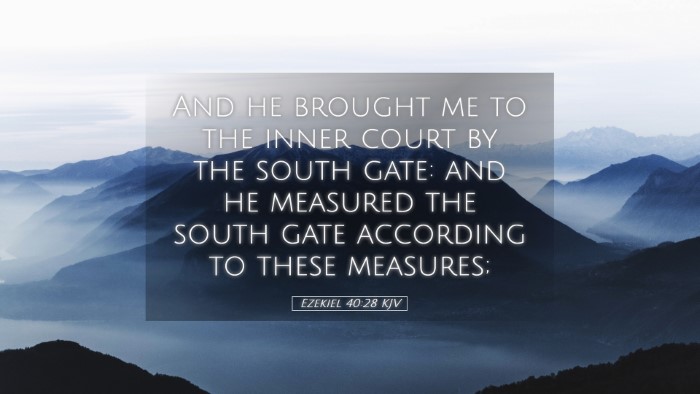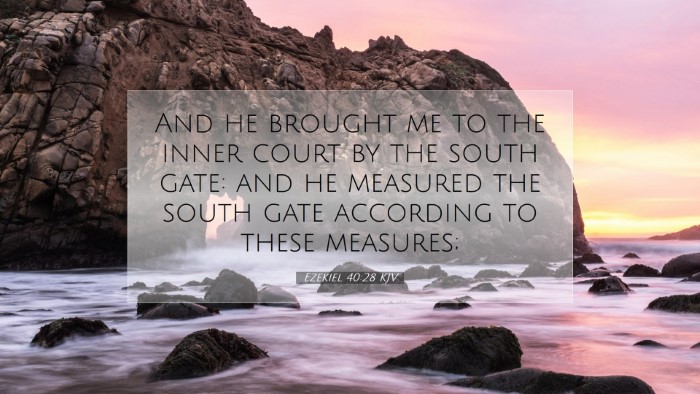Commentary on Ezekiel 40:28
Text of the Verse: "And he brought me to the inner court by the south gate: and he measured the south gate according to these measures;" (Ezekiel 40:28)
Introduction
The passage in Ezekiel 40:28 forms part of a larger vision that the prophet Ezekiel received regarding the restored temple in Jerusalem. This vision is meant to provide hope and direction for the exiled Israelites and to illustrate God's intentions for His people in the future. The meticulous description of the temple and its measurements indicates the precision with which God’s plans are laid out, emphasizing the importance of divine order and worship.
The Context of Ezekiel 40
Ezekiel's vision comes after his prophecies of judgment and the hope of restoration. In chapters 40-48, he describes a new temple, a new city, and a renewed land, reflecting God's gracious intention to dwell among His people once again.
This chapter begins a detailed outline of the temple complex, and the measurements serve not just architectural purposes but symbolically reflect the perfection and holiness of God.
Insights from Public Domain Commentaries
Matthew Henry’s Commentary
Henry highlights the significance of the inner court as a privileged area where worshippers are brought nearer to God. The south gate symbolizes access to God's presence, suggesting that there is a way to come before the Lord that is divinely ordained. He notes that the measurements indicate exactness and perfection, symbolizing the holiness of worship. Each detail recorded serves not just a practical purpose but also invites reflection on the nature of God’s covenant with His people.
Albert Barnes’ Notes on the Bible
Barnes emphasizes the orientation of the temple gates and their significance in relation to worship practices. The south gate, in particular, might hold specific relevance, as it was one of the primary entrances to the inner court. He notes that as the temple is measured, it represents the idea of divine ownership and authority over the place of worship, reminding believers that worship must be conducted according to divine specifications. This also intimates God’s desire for an organized and reverent approach to worship.
Adam Clarke’s Commentary
Clarke focuses on the spiritual implications of the measurements given for the gates and the courts. He observes that the precision of the measurements reflects the perfection of God’s plans for His people. Clarke suggests that in coming before God, individuals should prepare themselves spiritually much like the priests would prepare the temple. This verse serves as a reminder of the sacredness of entering God’s presence and underscores the importance of following God’s laws in worship.
Theological Reflection
This verse, while specifically describing a physical structure, has profound theological implications. The act of measuring, as seen throughout the chapter, signifies God's sovereignty and the order He brings to what might be chaotic circumstances. In the context of Ezekiel's audience—exiles in Babylon—this vision signifies hope and restoration, promising that God has not abandoned His people and desires a renewed relationship with them.
Furthermore, the focus on the inner court signifies the believer's journey into deeper fellowship with God. The gates' measurements serve as a reminder for contemporary readers about the importance of engaging in worship that honors God’s holiness and majesty. Just as the dimensions were given with care, so should our approach to worship be marked by reverence and joy in engaging with the divine presence.
Application for Today
For pastors, students, theologians, and scholars, Ezekiel 40:28 calls for a deeper understanding of the necessity of structure and order in worship. Here are some applications:
- Worship Design: The details in the description encourage worship leaders to prioritize a worship environment that reflects God’s holiness, including careful thought toward the arrangement of space and elements of worship.
- Spiritual Preparedness: Just as the priests prepared to enter, individuals today should seek inner purity and readiness before approaching God in prayer or worship.
- Community and Access: The idea of the gates provides a metaphor for community access to God. Believers are called to be bridges, facilitating access to God for others through evangelism and service.
- Divine Order: The meticulous detail calls for a respect for the order that God has instated both in the church and in one's personal life.
Conclusion
The verse Ezekiel 40:28, while part of a broader temple vision, serves as an enduring reminder of the expectation of holiness, order, and reverence in approaching God. Through the insights drawn from commentators like Matthew Henry, Albert Barnes, and Adam Clarke, we are reminded of the significance of worship and the profound hope that God provides for His people through His promises of restoration. In both historical and contemporary contexts, the essence of these teachings continues to be relevant and transformative.


